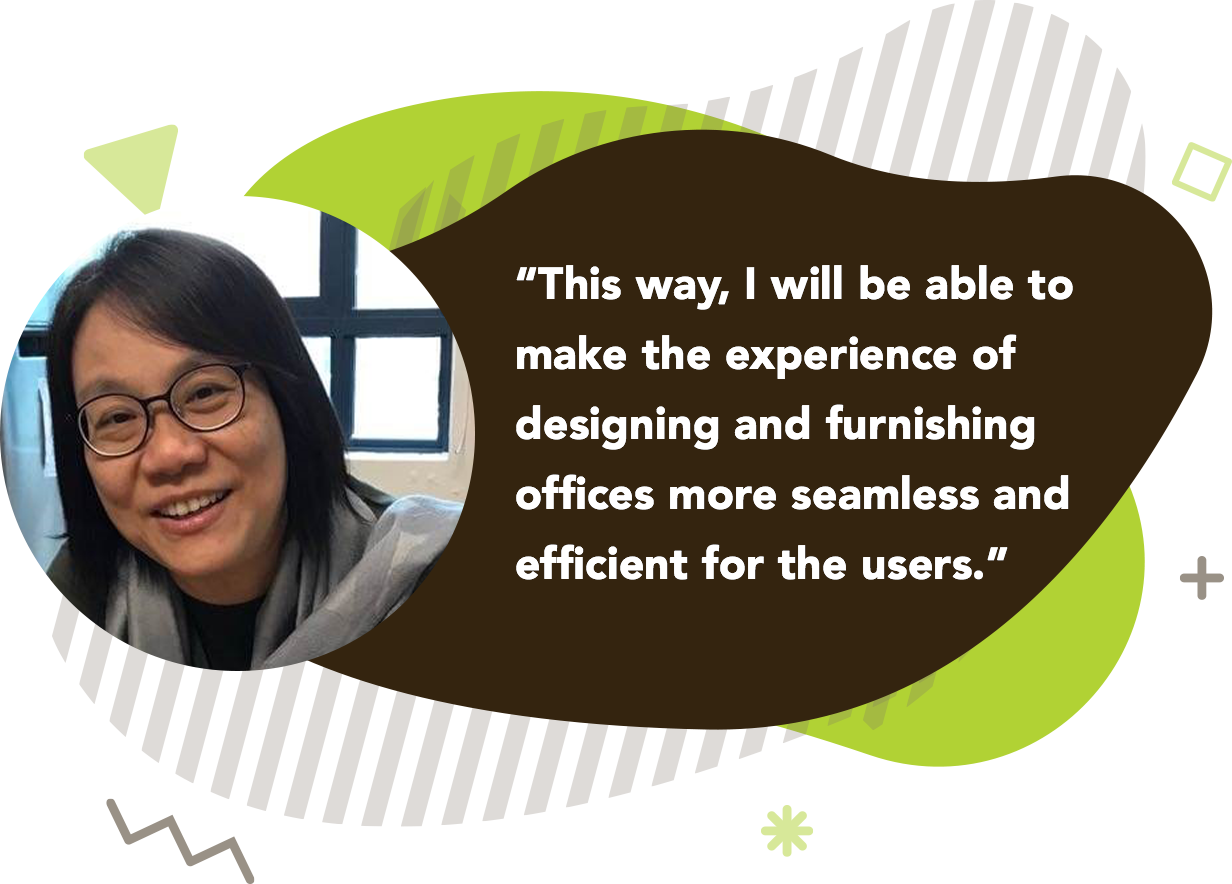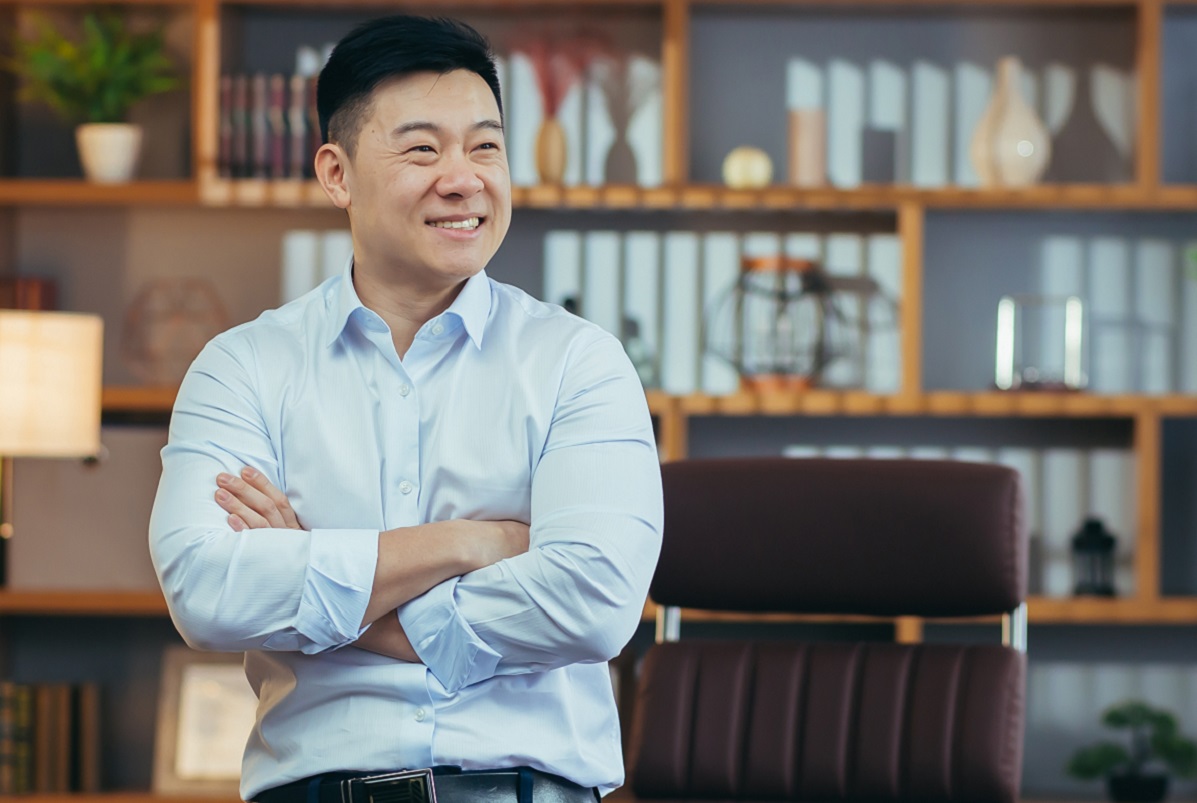As Manager of Business Services, Alison Liew of OCBC Bank is responsible for sourcing the right furniture and fittings for each office, based on users’ requirements. And she loves her job – nothing gives her a sense of fulfilment like being able to create a space that is both functional and enjoyable for her colleagues. Especially rewarding is when her colleagues thank her for implementing such great changes to their workspace.
“I’m very passionate about my tables and chairs,” she laughs, good-naturedly. But in truth, what she does is highly solutions-focused and requires deep empathy.
“Before renovating the office, I first need to understand the user’s requirements. I then help the user go through the furniture catalogue to select the right kind of furniture for their operational needs.”
Seems straightforward enough, right? In reality, there are many challenges invo
lved in furnishing a communal space that fulfils the needs of a perse group of people, all with different ideas, opinions, and desires.
And to better meet these challenges, Alison needed training to upskill herself.
Seeing through the User’s Eyes
Let’s go back in time to March 2019. Recognising the onslaught of digitalisation and its impact on the workplace, Alison felt a d
esire to self-improve so that she could continue to add value and remain relevant in her role.
She approached her supervisor to find out what she could do, and received a recommendation to join the Professional Conversion Programme (PCP), a reskilling initiative and part of Workforce Singapore's (WSG) Adapt and Grow Initiative.
Through the programme, she attended one course that would radically change the way she approached her work: Human-Centred Design.

“The most important tip from the instructor was , ‘Don’t jump to providing solutions to your user immediately after you get their requirement. The solution might be something that you want to provide, but it may not be what the user wanted.’ ” Alison shares.
“The Human-Centred Design course teaches us to probe further. If the user says they want a chair, we should ask, ‘What kind of chair? What is the lifestyle of the user? What do they spend most of their time doing in the chair?'”
“So in fact, the keyword is not ‘chair’, it’s ‘seat’. We are supposed to find a comfortable seat.”
Since completing her PCP, Alison has revamped her way of working in Business Services. In addition to asking the right questions, Alison also listens more actively and provides more options to her colleagues.
Revamping Old processes with New Tools
As part of her PCP, Alison had to conceptualise and complete a personal project within half a year. Thinking back to the hiccups she has encountered in her daily work, Alison chose to develop a furniture catalogue to help her better communicate the variety of furniture that she can provide to her colleagues.
“What we did previously was we sent emails to our user with the different types of furniture that they can choose from. These information were not consolidated, and sometimes the user may end up confused.”
With a catalogue, Alison can compile the information on all the furniture, which users can browse through in their own time. The catalogue also contains information like measurements and prices, so users can choose the right pieces based on their budget and needs.

Her team is currently developing an online version of the catalogue to further streamline and automate the furniture selection process. This online catalogue will allow users to select their desired furniture, and Alison’s team will be informed of their selections.
“When this online catalogue is completed, I will have more time to devote to value-added services such as deep-ping into cases which require more exceptional handling.”
These projects certainly take effort and time, but Alison is happy to embrace the change if it means she can better meet her colleagues’ needs.
Working together to build an enjoyable workspace
With change comes challenges. “Previously, because people have very limited choices, they will just take what you have recommended,” she explains. “But now with a lot of options available, people may put their personal preferences over their operational needs.”
Managing expectations and balancing the needs of a perse workforce are also challenges that Alison has to face daily – especially when dealing with multi-generational teams. “The older colleagues will just ask you for your opinion and they agree with you,” she laughs. “But the younger generation… they have their own set of thinking.”
When she feels that her colleague’s choices are not suitable for their needs, Alison organises site visits to other offices for them to see and feel the furnishings in real life. “They can see the furniture, touch, feel, try it maybe, and even talk to the users who are using the furniture now and ask for their opinions,” she says.
She sometimes even arranges for vendors to create mock-ups for her colleagues to try, and after seeing their ideas in real life, many realised that what they initially wanted wasn’t really suitable after all.
“When we manage to convince a user to change the type of furniture they initially selected, and then when they start to use it and they come and tell us, ‘Good thing I accepted your proposal, it’s a good proposal.’ it’s a really proud moment for us.”
Diversity Broadens Perspective
Alison greatly enjoys working with colleagues from different age groups; while they can have different opinions and way of thinking, they also bring fantastic new ideas that she can implement across different offices.
One great idea from her younger colleagues was the concept of a mobile TV wall attached to a height-adjustable table that could be moved around the office for quick meetings. “Our new office concept is to have collaboration areas,” she explains. “You can use these areas if you can’t find a meeting room, or if you just want to have a short or impromptu discussion.”
The flexible combination of a multimedia element (a Flip TV with NFC sharing and screen mirroring instead of a projector) and a height-adjustable table (for those who prefer to stand instead of sit) proved so popular that it has since been introduced to multiple offices across OCBC.
Taking the Step Towards Personal Growth

As a warm, upbeat person throughout her interview, you’d never have guessed that Alison is a self-confessed introvert. “I am naturally very shy,” she says. “But through the courses I attended via PCP, I am now able to open up more to my colleagues.”
And she believes that if you want to change the way things are done, you need to start with changing your own internal mindset. “Things like listening skills, interviewing skills – I didn't need these in my job previously. The only question we would ask was, ‘How many staff do you have and what is the size of the office?’ ” she shares.
“Now, I probe further and ask the user, ‘What is your day-to-day job like? Do you have a lot of discussions, or do you discuss a lot of confidential stuff?’ Then I visit their offices to match the requirements they have given and see how I can help them.”
“It was challenging initially, because it’s habitual that when I hear requirements, I immediately want to provide solutions,” she reflects. “But now I listen more.”
Her commitment to implementing lasting, positive change in the bank’s business processes has earned Alison the IBF Outstanding Financial Services Professional Award in 2019. But she hasn’t let it get to her head. “A lot of my colleagues actually don’t know that I received the award,” she laughs. “To them, I’m the same Alison as I was ten years ago.”
The true reward she cherishes is her colleagues’ satisfaction in a thoughtfully designed and well-furnished office.
As for her parting words of advice, Alison says, “Don’t be afraid of change – they present new opportunities for you to equip yourself with new skillsets.”

This article is part of a series of stories on PMETs who have gone through an upskilling or reskilling transformation journey within the banking and finance industry.
.png?sfvrsn=7a1194d1_1)
 Overview
Overview














.png?sfvrsn=86556ebb_1)
.png?sfvrsn=a8212bcc_1)
.png?sfvrsn=858c63d1_1)
2b4307cf-e91f-4368-ac62-cf234d6d2b1c.png?sfvrsn=212575fd_1)